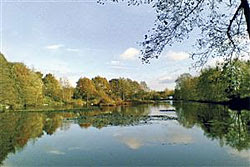 Otters eat fishery out of existence
Otters eat fishery out of existenceThe true horror of the devastating effect otter predation is having on the nation’s still-waters emerged this week after an angling club was forced to give up the lease on a venue it had controlled for more than 60 years.
Officials at Bungay Cherry Tree AC in Suffolk worked tirelessly for seven years to rid the popular Ditchingham Club Pit of the predators but failed to stop the endless stream of fish deaths.
In a final push to save the popular water, the club enquired about otter-proof fencing to surround the perimeter of the three-acre pit, but was forced to shelve its plans after discovering it would cost a staggering £18,000.
Unable to afford the huge sum, the club was forced to admit defeat and announce to its members – some of whom had fished the water for over half a century – that they would no longer be able to fish the picturesque venue.
Officials estimate that over £40,000 worth of fish have been killed by otters since the species moved into the area, and club secretary Mark Casto told Angling Times: “We have found carp to 35lb ripped apart on our banks, and it’s soul-destroying. The only way to stop these creatures ruining our still-waters is to build fences, but the cost is well beyond our means. The situation should never have been allowed to get to this but, now that it has, clubs like us should be compensated – it’s as simple as that.”
Last year Environment Agency bosses were accused of underestimating the problem when they offered a meagre £100,000 to fund otter fencing projects across the country, but EA head of fisheries Mat Crocker has now moved to assure anglers that increased funds will be available in 2010.
“Fence funding comes from the angling projects budget and this will be increased next year by £1m, meaning more money will go towards otter predation prevention. We recognise it is a serious problem and one of the key issues in angling, and I would urge clubs to act early and work with local fisheries teams to help us identify the problems quickly,” he said.
Another key player in the fight against otter predation has been the Angling Trust. Officials from the governing body have worked closely with the EA and Natural England to create an amicable solution.
“Undoubtedly more cash is needed. The £100,000 handed over was just a drop in the ocean and it wouldn’t help many clubs,” said Trust chairman Mike Heylin.
“My own fishing club has a water that would cost £80,000 to fence, and it is less than three acres in area.
“The increased budget is good news, and clubs need to put bids in to the EA for funding and keep banging on the door even if their first application is rejected.”








